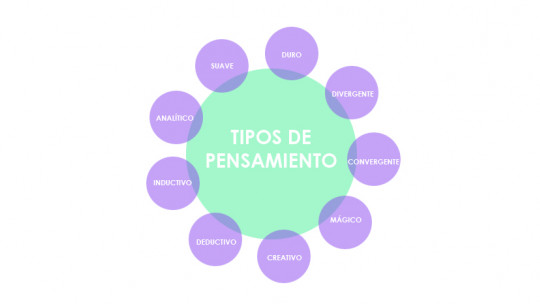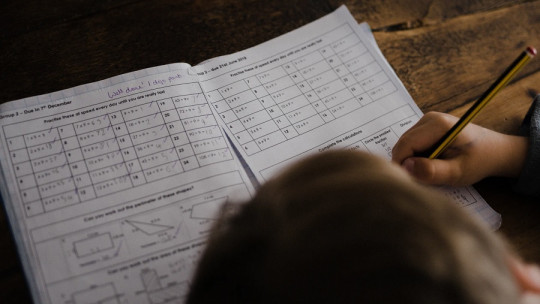
The complex mind of the human being allows us to carry out different forms of thought, and abstract is one of them.
Let’s delve into this process to discover what they are. the main characteristics of abstract thinking and the usefulness it has compared to other forms of thinking that we also carry out on a regular basis.
What is abstract thinking?
The mental processes included within abstract thinking refer to those whose content are not elements that the individual is facing at that precise moment Abstract thinking is also considered to be that which is aimed at reflecting on the causes or principles that underlie certain phenomena.
It is a very complex form of thought that represents a qualitative leap compared to concrete thinking, one in which the object of our reflections is before us. On the contrary, abstract thinking allows for a series of much more elaborate reasoning, which is based on the most recent brain structures, evolutionarily speaking.
These types of mental processes They first appear in early adolescence, approximately The famous author Jean Piaget already talked about processes related to abstract thinking when he established his different stages of cognitive development. Once the individual develops this capacity, he will be able to face much more intricate problems, applying logical reasoning that will allow him to overcome different situations.
Thanks to abstract thinking The human being is capable of deliberately focusing his reflections on one element or another, at will This also provides you with the ability to evaluate various objects or ideas, comparing them with each other and analyzing them at the same time, without the need for any of them to be present at that moment.
Main qualities of abstract thinking
Abstract thinking has several characteristics that make it very special. We have already mentioned some, but we are going to look at the most important ones in more detail.
1. Ideas about missing elements
We have already seen the first of the qualities in the first point. It is about the capacity that abstract thinking gives us to being able to bring to our mind various elements that we know but that are not necessarily in front of our eyes at that moment Although it may seem banal, it is not so banal if we look at the capabilities of a child.
In the case of the youngest children, when they have not even developed the perception of object permanence, there may be situations in which the adult in front of them, simply by covering their face with their hands, will seem to have disappeared before the child’s eyes. baby. The opposite also happens, when the small child will think that by closing his eyes or covering them the adult will no longer be able to find him.
Returning to the ability to think and reason about elements that are not in front of us, we must give this quality the magnificent importance it has, because without it we would not be able to make plans or interpret any idea that was separated from the objects that in a given moment are within reach of our senses. In short, it is one of the capabilities that makes us human.
2. Thinking of abstract ideas
Thinking about abstract ideas may be a redundancy of the previous point, but in reality it is not. In this case we are not referring to having the capacity to power reflect on things that we cannot see or touch at that moment, elements that are intangible and therefore we could never physically perceive them.
We handle abstract concepts constantly even if we do not realize it. It is common to think about the beauty of a person, about acts of goodness or evil, we have feelings such as joy, anger or resentment, we know when something is fair or unfair, we have beliefs, desires, hopes or dreams. Some people are poor while others have a lot of money and are therefore rich.
All of them are abstract ideas, but it does not pose any problem for us to reflect on each of these concepts. It is something that we can do thanks to our ability to have abstract thought, so we must not fail to take into account the importance of this second quality.
3. Deep reflections
Continuing with the skills that abstract thinking gives us, another of the most important would be to be able to carry out deep reflections. Can analyze an element or situation in detail and draw conclusions that help us overcome an obstacle or even anticipate a possible problem thanks to our learning
Faced with a certain event, we can try to understand what the event was that caused it, what were the factors that contributed to it happening in that specific way and finally we can think about the possible repercussions that said event will have. in the future.
But this quality goes further, since it opens the doors of metacognition, the ability to reflect on our own thoughts and extract other types of learning. For example, we can interpret where our mood comes from or why we adopt a certain position on a specific issue, getting closer to the origin of our beliefs or values.
4. Different interpretations
The capacity for analysis that we anticipated in the previous point represents another advantage of abstract thinking that deserves a separate mention. It is about the ability we have to be able to interpret an event in very different ways It is obvious that this happens constantly, since it is enough to imagine any fact to realize that different people will have different beliefs about it.
Whether they are political decisions of an administration, a play during a game of any sport or an episode of a fashion series. The abstract reasoning that we can do about it admits as many interpretations as our imagination can reach. Each person will be able to add the nuances they deem appropriate and it will be a cause for debate or even discussion, depending on the importance that individuals attribute to their position.
Sometimes even the most objective facts are the subject of controversy and disputes arise about their true meaning and repercussions. It is the other side of the coin of this inexhaustible capacity to interpret that abstract thinking gives us. Double-edged weapon.
5. Detect relationships between elements
In line with the qualities we are seeing, we come to another of the main characteristics of concrete thinking. This would refer to the ability we have to be able to think about various elements and establish relationships between them Furthermore, by not needing the physical presence of these elements, we can hypothesize scenarios and thus be creative and innovative.
People who have this quality highly developed will probably stand out in artistic disciplines, such as music, cinema, painting or literature. Even in cooking, it is also an activity that requires a certain abstraction that allows us to interpret what ingredients or techniques we can combine to generate new dishes.
6. Scientific thinking
The previous point highlighted the usefulness of being able to capture the relationships between different concepts and thus be able to evaluate different ones. This ability is also the door to establish scientific reasoning Abstract thinking will allow us to hypothesize a certain phenomenon to try to explain it in a logical way. Furthermore, we will be able to test these hypotheses.
What’s more, thanks to this ability we are also presented with another different ability, and that is that we can observe a specific event and draw conclusions that allow us to interpret the logic behind it, that is, use inductive reasoning based on a specific case to find the underlying generalities. It is another of the most important methods when it comes to posing hypotheses in a scientific way.
On the other hand, we can also use the deductive method, which will allow us to adjust the general approaches of a phenomenon to a specific event, that is, just the system opposite to the inductive process. We are capable of carrying out all these complex cognitive processes thanks to the capacity for abstract thinking that we have.
How to improve abstract thinking
Obviously, as with the rest of mental abilities, not everyone has the same basic abilities when it comes to abstract thinking. The good news is that These abilities are not entirely static, but can be exercised to a certain extent through the practice of different tasks that involve their use.
1. Reflect
Reflection exercises are very effective and also very easy to carry out, since they can be done while we are in the shower, while we are on the subway or the bus, while we are walking down the street or in any situation in which we do not have the active mind in another process. It is enough to focus on a specific topic and investigate the causes, the repercussions, the feelings it awakens in us, etc.
These reflections do not have to be an individual act We can debate with other people and enrich each other with our arguments and force ourselves to think to clearly explain our position and the logic behind it.
2. The power of reading
Reading is an inexhaustible source of knowledge, but it also helps us work on our abstract thinking We can choose from a multitude of styles and genres and thus transport ourselves to infinite situations that will make us create an imaginary scenario in our head and lead us to reflect on new ideas or events, resulting in a most stimulating activity for our brain.
3. Create art
Reading, admiring paintings or watching movies are very enriching activities, but it is equally or more so to be the authors of said works ourselves. Obviously not everyone has the skills necessary to carry out a masterpiece, but The creation process is equally positive for our abstract thinking, even though we are by no means experts in a certain artistic discipline.








